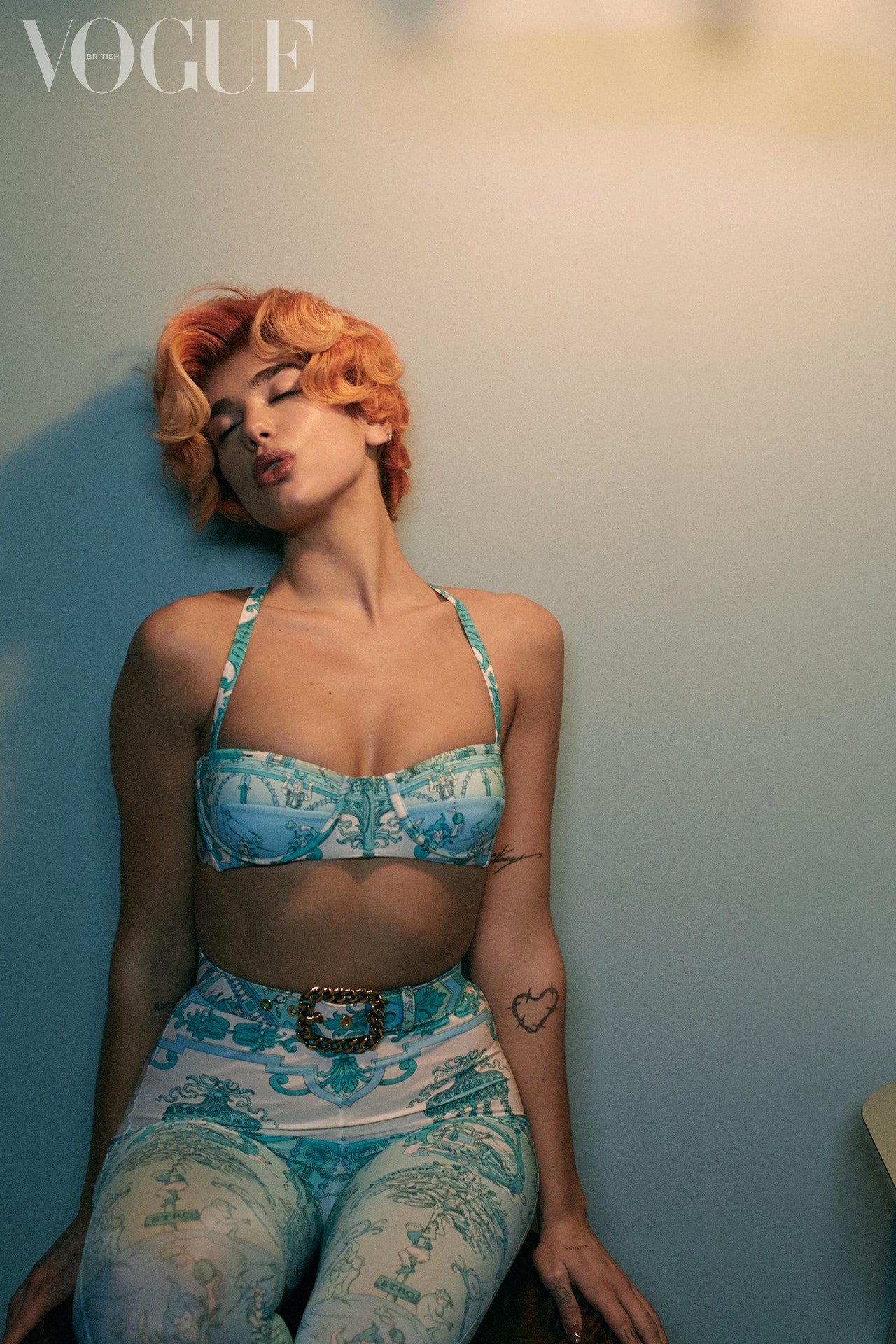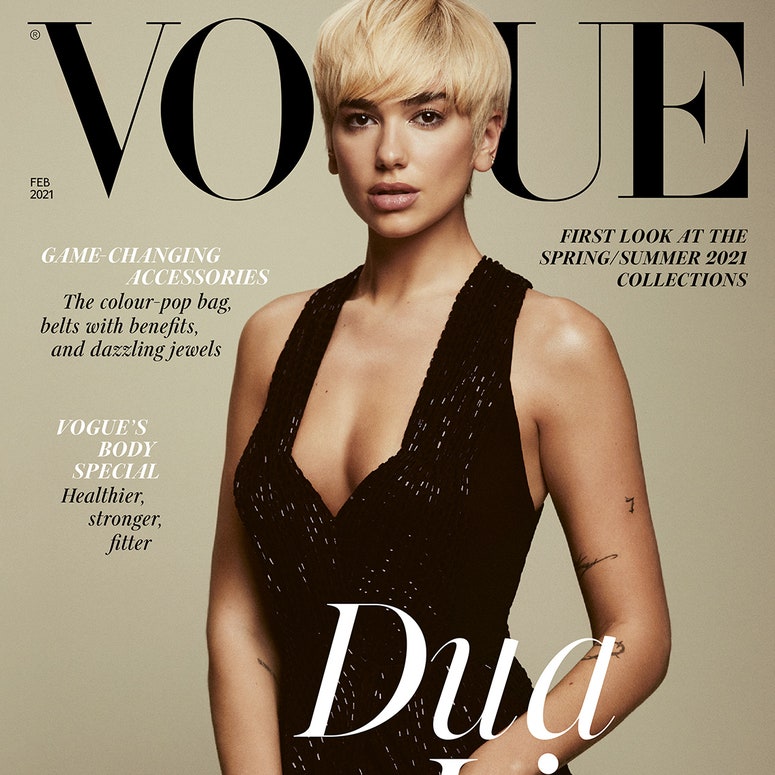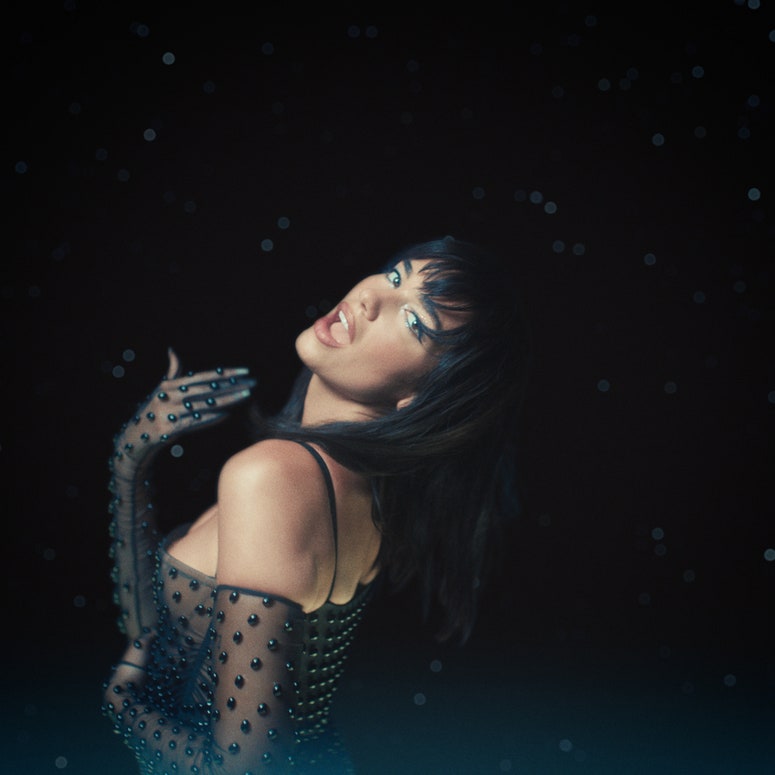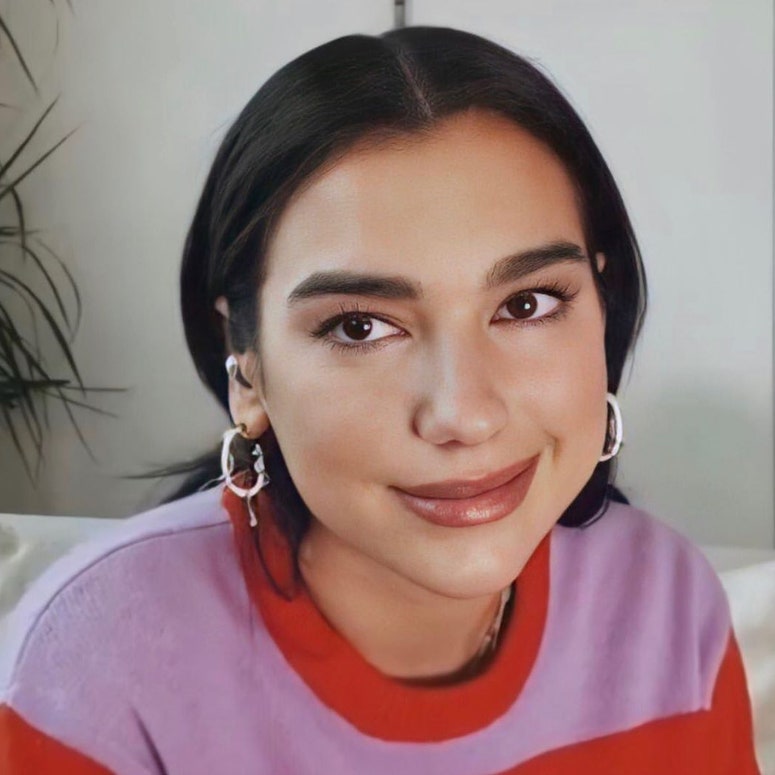When Dua Lipa guest-hosted Jimmy Kimmel Live! last August, one standout skit set the net ablaze. Who-a Lipa? saw one of Britain’s most famous musicians quizzing a group of pensioners, none of whom had any idea what a Dua Lipa was, let alone that they were talking to one. “That’s terrible,” one woman grimaces, as a giggling, disguise-free Dua holds up an image of herself in a yellow tartan crop top. “If I had a daughter, I wouldn’t want her to go out in that.” The stunt worked, of course, because of how major the two-time Grammy, two-time MTV Europe Music Award and three-time Brit winner has become – a singer who emerged from one of her industry’s toughest years as a pop behemoth.
How did she do it? “With my work, I’m always like, ‘OK, what’s next?’” she says, with a hint of the trademark husk she’s known for in her vocals. This restlessness, the 25-year-old admits, is partly because, when we speak, it’s the start of Britain’s second implemented lockdown. Plans to meet in person have been shelved and we’re on Zoom, me cross-legged on my bed, Lipa perched on a sofa in her London home, a series of tasteful framed prints behind her, including Jean-Michel Basquiat’s Untitled (Sugar Ray Robinson). The camera isn’t the best quality and the room is dimly lit, yet her Colgate smile and Insta-ready skin are positively glowing.
Dua was one of 2020’s rare winners. Although her UK and European tours were postponed, November saw her deliver a “multidimensional” concert experience, called Studio 2054, shot in a warehouse and live-streamed across the globe. Five million tuned in for the original broadcast – a record-breaking figure in live-streaming history. In the same month, her long-teased duet with pop powerhouse Miley Cyrus, “Prisoner”, dropped to much fanfare, as did the release of the extended version of her record-breaking album Future Nostalgia.
The first lockdown was challenging – she arrived back from a curtailed Australian tour to a flooded flat last March, meaning she and her boyfriend, model Anwar Hadid (brother to Gigi and Bella), spent isolation in an Airbnb. While artists such as Lady Gaga and Sam Smith postponed their albums due to the pandemic, Lipa’s risky decision to release her sophomore studio album wasn’t entirely her own. After it leaked online, she was left with little choice but to bring its launch forward.
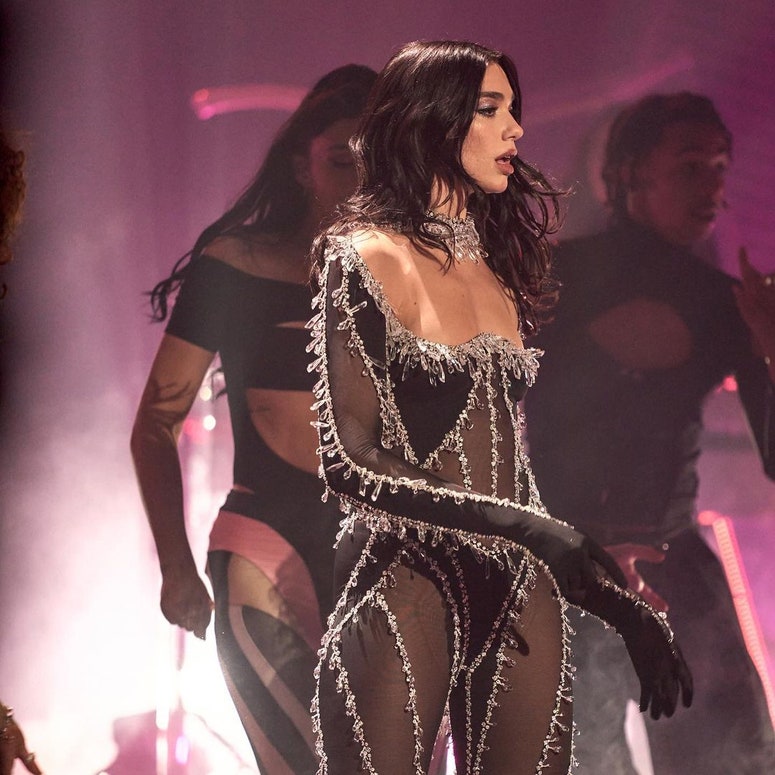
Initially, she feared her shimmering 1970s disco meets ’80s and ’90s pop bops would come off as tone-deaf. (“I’ve been a little bit conflicted about… whether it’s the right thing to do during this time, because lots of people are suffering,” she said during a teary Instagram Live.) In actuality, it was an unexpected panacea – a perfect mix of retro-tinged, new-era earworms to dominate bedroom listening for months. It became the most-streamed album by a British woman in a single day, and it cemented Lipa as an international star. It simultaneously brought three singles – “Don’t Start Now”, “Physical” and “Break My Heart” – into the top 10. The last British woman to achieve that was Vera Lynn, in 1952, and Lipa did it with a number one album to boot.
Calculated in sheer numbers (more than two billion YouTube views for her 2017 single “New Rules” alone), Lipa’s career might seem almost clinically successful, yet her real secret is an emotional one: the ability to connect. The “smile through the pain” ennui of Gen Z is her speciality, and she describes her oeuvre as “dance-crying” music or “dark pop”. On this album, however – and its thrilling new additional tracks – “dance” and “pop” take precedence. “I had to fight inner demons,” she tells me. “I wanted to write songs that were more sad, more about heartbreak, because I thought that writing happy songs would turn into cheesy songs. I had to fight that because I was like, ‘I am happy. I deserve to be happy.’ I should be able to write about that without the fear of feeling like I’m compromising my authenticity because I’m not crying about something or someone.”
Indeed she is not. She has been with Anwar for more than a year and a half, and last summer adopted a rescue puppy called Dexter. Her sizeable smile widens at the mention of Anwar, a guarded giddiness. Being highly visible yourself is one thing, being half of a highly visible couple another entirely. How does she navigate it? “We have all these incredible memories and experiences, and if there’s something that we want to share together, then OK, that’s fun,” she says of posting couple moments on Instagram. “But at the same time, we’re quite private – we’ll only show you as much as we want you to see. It’s a little bit of give and take, trying to find the right balance of being so excited and being in love, and wanting to share that with the people around me, but at the same time not wanting to put too much out there. I want to be able to just be happy in this relationship without having other people’s opinions.”
Like many, Lipa has a complicated relationship with the internet. Yes, it has been integral to her rise – it was where she made her name, and continues to do so. The #dualipachallenge, set to “Don’t Start Now”, lent itself to one of summer’s biggest TikTok routines. (“You know that song your kid listened to, like, 5,000 times trying to perfect a dance on TikTok?” she said on Jimmy Kimmel Live! “That was me. You’re welcome.”) But she has struggled with social media, highlighting its adverse effects on women in her 2019 Cambridge Union speech.
Last year, #dualipaisoverparty trended on Twitter, after a video of her in a strip club surfaced. Then there was the time she trended for a bad dance routine and, while she is willing to laugh at herself – she retweeted the most savage memes – her management now runs her account. Twitter was the first social media platform she had. She used it to connect with fans she’d meet post-shows, which now sounds absurd. “I would go into interviews and people would say, ‘How do you deal with hate?’And I’m like, ‘Hate? I don’t get hate, what are you talking about?’ It was so early on that people didn’t even care to try and say something mean.” As her star rose, however, things “got really hectic”. Despite her better judgement, she started endlessly scrolling hateful comments about herself. “I would get anxiety,” she says. “And I was like, ‘This shouldn’t be the way that I’m experiencing this once-in-a-lifetime experience.’ It was messing with my confidence. I’d be super-nervous, wondering what everyone’s gonna say.”
While life in the public eye can take its toll, Dua asserts that much has remained unchanged. “My home life is really normal,” she says. “The people I surround myself with have known me for the longest time. My job doesn’t define my circle, and that makes a world of difference.”
Lipa’s roots lie in Pristina, Kosovo, from where her family fled in 1992, driven out by forces under the direction of Serbian president Slobodan Milosevic. As refugees, her parents came to London, where Dua was born. In Kosovo, her father was studying to be a dentist, her mother to be a lawyer. Both worked as waiters in the UK, while retraining in business, and travel and tourism respectively. The family returned to Kosovo for a time in 2006, when Dua was 11. It goes without saying that Lipa is staunchly anti-Brexit and troubled by anti-immigration rhetoric. “People don’t leave their home country unless they have to a lot of the time,” she says. “To save their families, to try and get a better life. People want to be where their family is, where their home is, where they speak the language that is native to them, where they have their own culture.”
At 15, Lipa convinced her parents to let her move back to Britain alone, to follow her dream of performing. They agreed, primarily because of the opportunities in the arts in the UK – something Dua hopes to provide in her homeland through the Sunny Hill Foundation, which she set up with her father. “People don’t know where it is or think it’s just war-torn,” she explains. “I want to be able to show the other side.”
After moving in with a family friend in north London, she attended the Sylvia Young Theatre School at weekends and made a name for herself by uploading cover songs online. There followed a modelling stint and a fashion blog – unsurprising, given Lipa’s much-documented wardrobe and endorsement deals with the likes of Pepe Jeans, Puma and YSL Beauty. She doesn’t rule out a return to the runway, but as a designer – “I’d love to do something fun in terms of fashion,” she says. “At the moment, my focus is music, but I want to be able to branch out and do something else. I would love to start a brand at some point, even if I start off really small. I have to take it in baby steps.”
It’s a savvy goal, given the traditionally fickle nature of the music industry; the road to success is littered with less tenacious, less supported artists. “For women, it’s a lot harder to solidify yourself as an individual in music,” Dua nods. “In a perfect world, we wouldn’t have to prove ourselves so much to the point that maybe we run ourselves into the ground of being like, ‘I must be heard.’ But that is the world we’re in right now.” Yet it is on the back of her success that a slower rise is at last becoming normalised, with labels more willing to allow female artists time to find their feet; her wins are, in part, wins on behalf of the women the industry can so easily discard. She smiles. “I like to prove that I can do it. I’m stubborn.”
Photographs: Emma Summerton. Styling: Kate Phelan. Hair: Shon Hyungsun Ju. Make-up: Lisa Eldridge. Nails: Michelle Humphrey. Set design: Emma Roach. Production: Shiny Projects. Digital artwork: SKN-Lab.
The February 2021 issue of British Vogue is on newsstands Friday 8 January.
More from British Vogue:
